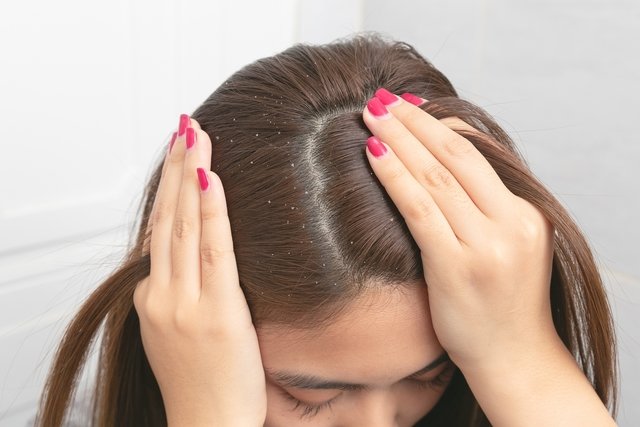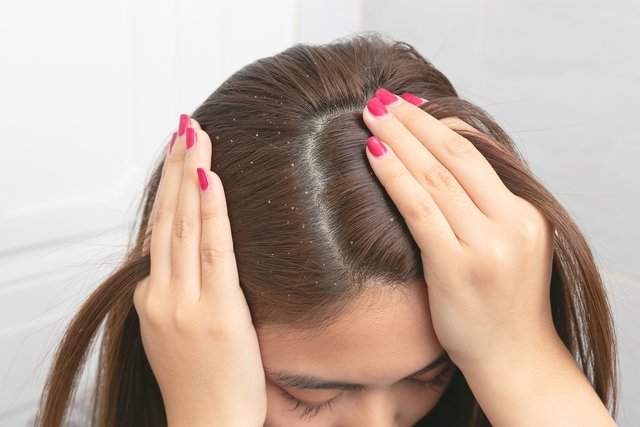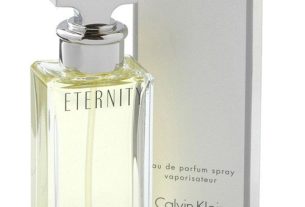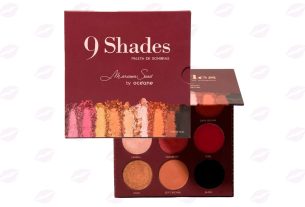The secret to getting rid of dandruff once and for all is to keep the oiliness of your scalp under control. To do this, washing your hair with anti-dandruff shampoos or shampoos that contain ingredients such as selenium sulfide, ciclopirox olamine or ketoconazole can be the solution, especially when there is more dandruff.
Furthermore, adopting simple precautions, such as avoiding washing your hair with very hot water, controlling stress and avoiding the use of caps, also allows you to keep dandruff under control for longer. The use of home remedies for dandruff, such as tea tree essential oil or castor oil, can also help, but it is important that they are guided by a doctor or herbalist.
The flaking and itching caused by dandruff can be mild, medium or intense. In all three situations, it is important to consult a dermatologist to recommend the most appropriate treatment.

Below we indicate the main forms of treatment for dandruff:
1. Shampoos anti-caspa
The itching and flaking of dandruff can almost always be controlled with the use of shampoos. For mild dandruff, daily cleansing with a mild shampoo is recommended first to reduce the build-up of oil and dead skin cells on the scalp.
In cases where there is no improvement with neutral shampoos or in cases of medium or severe dandruff, a medicated anti-dandruff shampoo can be used. Anti-dandruff shampoos that may contain different substances:
- Zinc pyrithione: has antifungal action and helps to remove and prevent the formation of oil on the scalp, keeping the region drier;
- Coal tar: acts by reducing the speed with which scalp cells die and flake off, reducing the formation of dandruff;
- Salicylic acid: It has an astringent action, in addition to unclogging pores and balancing the skin’s oil level. In some shampoos, salicylic acid may be associated with ketoconazole because it improves the penetration of ketoconazole into the skin and its antifungal action;
- Ketoconazole: works by killing dandruff-causing fungi that live on the scalp and can be sold with or without a prescription;
- Selenium sulfide: has antifungal and antibacterial action, in addition to reducing the renewal of scalp cells, reducing the formation of dandruff and treating ringworm;
- Ciclopirox olamina: It has antifungal action, in addition to promoting scalp hygiene, preventing the appearance of dandruff.
These shampoos can be used initially one to three times a week to treat dandruff. In case of improvement, it can be reduced to once a week or less frequently for maintenance and prevention.
It is important to always read the instructions for use of each shampoo, as some must be left on the head for a few minutes to take effect and others must be used and rinsed immediately. If one type of shampoo works for a while and then stops working, you can alternate between two types of dandruff shampoo.
2. Medications
Other useful options for getting rid of dandruff are topical solutions containing salicylic acid, antifungals or corticosteroids, which may be recommended by the dermatologist in case of dandruff with inflammation and itching.
Furthermore, the use of medicines such as spironolactone may also be recommended by the doctor, which, despite not being indicated for this purpose, its side effects reduce the oiliness of the hair, being useful for eliminating dandruff. Learn more about spironolactone.
3. Home remedies
Some home remedies can help get rid of dandruff as they have antiseptic, antifungal and anti-inflammatory properties, such as tea tree, rosemary, eucalyptus or peppermint essential oils, for example. To use them, simply choose an essential oil and add 1 drop for every 10mL of shampoo you use on a daily basis. Another good option is to use coconut oil in your shampoo, adding 1 drop of the oil for every 10mL of shampoo, as it helps to hydrate the scalp and reduce the inflammation that causes dandruff and itching.
See how to prepare a shampoo for dandruff and check out other tips that help keep your hair clean:
Furthermore, rose water also has astringent and anti-inflammatory properties that help control and combat dandruff.
The use of natural shampoos made from herbs such as rosemary, thyme, celery, sage and eucalyptus can also be effective against dandruff, due to their antiseptic and antifungal properties. See how to prepare natural shampoos for dandruff.
4. Hair care
Some useful precautions to get rid of dandruff faster are:
- Avoid baths with very hot water, as this stimulates the oiliness of the hair roots;
- Avoid washing your hair every day, as the scalp can produce more oil to compensate for the removal of oil from the hair;
- Avoid using hair conditioner;
- Avoid foods rich in fat;
- Drink no minimum 1.5L of water per day;
- Avoid stress;
- Avoid sleeping with wet or damp hair;
- Do not rub your scalp with your nails, as this could cause head injuries. Massage with your fingertips, in soft, circular movements;
- Avoid using caps and hats.
Eating a diet with healthy foods is an important factor in eliminating and preventing the reappearance of dandruff, therefore, it is recommended to include fruits, vegetables and foods rich in zinc and vitamin B in your diet to control the oiliness of the scalp and avoid citrus fruits, dried fruits and preserved foods. Check out the complete list of foods rich in zinc.
Bibliography
- NHS. Dandruff. Available at: <https://www.nhs.uk/conditions/dandruff/>. Accessed on January 6, 2021
- MAYO CLINIC. Dandruff: Diagnosis & Treatment. Disponível em: <https://www.mayoclinic.org/diseases-conditions/dandruff/diagnosis-treatment/drc-20353854#:~:text=The%20itching%20and%20flaking%20of,routine%20that%20works%20for%20you.>. Acesso em 06 jan 2021
- ZAREIAN, Muhammad Ali; et al. Etiology and treatment of dandruff according to Persian medicine. Dermatologic Therapy. 32. 6; e13102, 2019
- ATENEU FACULTY: HIGHER EDUCATION – UNDERGRADUATE AND POSTGRADUATE, FORTALEZA. Essential Oils and their Importance in Cosmetic Treatments. 2015. Available at: <https://uniateneu.edu.br/documentos/oleos-essênios-e-sua-Importancia-nos-tratamentos-cosmeticos.pdf>. Accessed on January 6, 2021

Sign up for our newsletter and stay up to date with exclusive news
that can transform your routine!
Warning: Undefined array key "title" in /home/storelat/public_html/wp-content/plugins/link-whisper-premium/templates/frontend/related-posts.php on line 12
Warning: Undefined array key "title_tag" in /home/storelat/public_html/wp-content/plugins/link-whisper-premium/templates/frontend/related-posts.php on line 13





